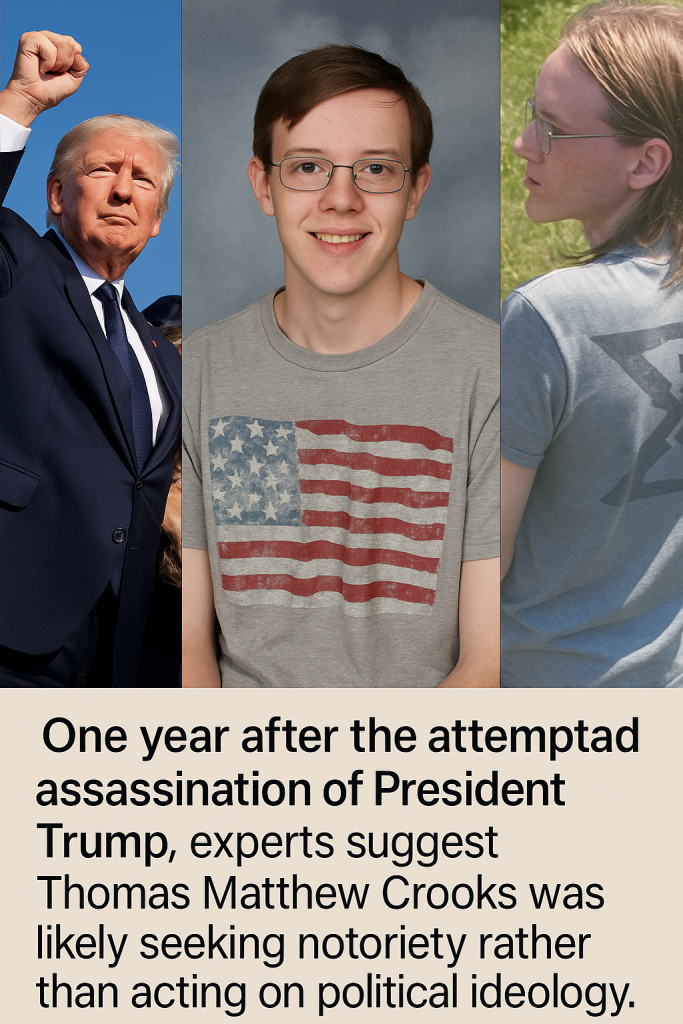It has been one year since the shocking attempted assassination of former President Donald Trump, an event that rattled the nation and prompted intense scrutiny into the motives behind the attack. The accused, Thomas Matthew Crooks, was apprehended before he could carry out his deadly plan, but the questions surrounding his true intent have lingered.
Recent analyses from behavioral experts and security analysts now suggest that Crooks was driven more by a desire for notoriety and personal infamy than by any coherent political ideology. This reassessment offers new insight into the complex psychological factors behind high-profile political violence in today’s charged environment.
Background on the Incident
On the anniversary of the attack, officials and experts revisited the case to better understand what motivated Crooks to target one of the most polarizing figures in modern American politics. The assailant had been intercepted by law enforcement in possession of weapons and materials indicating a premeditated plan to assassinate the former president.
Initially, speculation ran rampant that Crooks was inspired by extremist political views or radicalized ideologies. However, as investigators dug deeper into his background, online footprint, and communications, a different pattern emerged.
The Shift in Expert Opinion
Psychologists specializing in criminal behavior and terrorism noted that Crooks exhibited traits consistent with attention-seeking and delusional grandiosity. Rather than demonstrating a coherent political agenda or allegiance to a specific faction, he appeared to have concocted the plot as a means to inject himself into the public spotlight.
“Our analysis indicates that Crooks lacked any sustained political philosophy. Instead, his behavior aligns with individuals who pursue violent acts primarily as a means of self-promotion or to gain recognition,” explained a forensic behavioral analyst who reviewed the case documents.
Indeed, Crooks’s digital activity leading up to the attempt revealed sporadic and contradictory statements, none reflecting a consistent ideological stance but rather erratic postings likely intended to attract attention.
Broader Implications for Security and Prevention
Understanding Crooks’s motivation as rooted in notoriety rather than political extremism has important ramifications for threat assessment and prevention. Experts emphasize the need for security agencies to recognize that not all violent political acts arise from ideological extremism — some are the desperate acts of individuals craving fame, regardless of cause.
This distinction underscores the challenge of predicting and thwarting such attacks, as notoriety-driven perpetrators may not fit traditional profiles of radicalization. Consequently, mental health interventions and social monitoring may become vital components alongside conventional political threat detection.
Reflections One Year On
As the nation reflects on the anniversary of the attempted assassination, the Crooks case serves as a sobering reminder of the complex motivations that can underpin acts of political violence. While ideology often plays a role in such incidents, this case highlights how personal psychological drivers, such as the craving for infamy, can be equally potent catalysts.
Law enforcement continues to study this case closely to refine their approaches in identifying and intervening with individuals whose aim is disruption through notoriety, thus enhancing public safety without solely focusing on political motivations.
As authorities and experts evolve their understanding, one thing remains clear: the path to preventing future tragedies lies in addressing the full spectrum of potential motivators behind violent actions — from ideology to individual psychology.



